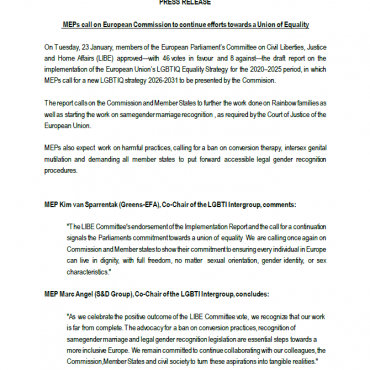European Parliament: Greater effort necessary for LGBTI equality at EU level
In a key report on gender equality adopted Tuesday, the European Parliament has demanded to strengthen action on the rights of LGBTI people.
 In the annual report on gender equality the parliament urges the Commission to expand the scope of EU hate speech law, as to include incitement to hatred on grounds of sexual orientation, gender identity and sex characteristics (par. 38).
In the annual report on gender equality the parliament urges the Commission to expand the scope of EU hate speech law, as to include incitement to hatred on grounds of sexual orientation, gender identity and sex characteristics (par. 38).
Concerning transgender and intersex rights, the report specifically highlights that the future EU Strategy for Gender Equality should be inclusive of inclusive of transgender and intersex people (par. 7).
Furthermore, Parliament urges Member States to include “the grounds of gender identity and sex characteristics within their gender equality legislation when implementing EU gender equality Directives.” (par. 40) This would mean that in employment, access to goods and services and in social protection, discrimination against trans and intersex people would be forbidden.
Lastly, the report specifically addresses the situation of refugee victims of violence based on . . . [their] sexual orientation or gender identity”, stating that they should receive support “at all stages of the migration process”, including measures such as immediate relocation in case their safety cannot be guaranteed, mental health support and immediate gender identity recognition for the duration of asylum procedures.
Ernest Urtasun MEP, Member of the LGBTI Intergroup and author of the report, reacted: “I am very glad that a wide majority of the Parliament has voted in favour of gender equality and equal treatment of LGBTI people. It is now up to the Commission to ensure that their day to day work will reflect this progressive stance.
Sophie in ‘t Veld MEP, Vice-President of the LGBTI Intergroup, added: “This is the first time that the parliament has adopted such a clear position against discrimination of trans and intersex people. Too long this has been overlooked, and I believe we should tackle these human rights violations rather today than tomorrow.”
Read more






